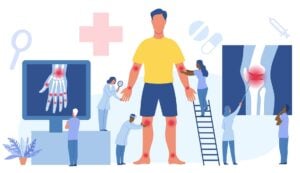1. A SPECIALITY or SPECIFIC QUALIFICATIONS
(e.g. Pain, Psychiatry, Physical Therapy, Anaesthetics)
To commercialise a business concept such as sponsored research or grant-based research means first knowing what unique skill set you can offer. Can you perform a specific technique, can you use a specific device, are you qualified to assess certain outcomes, do you treat a certain type of population?
- This has the greatest potential to affect access to research projects and clinical investigations
- This has the greatest potential to affect budgets and your standard costs
- This is also the best indicator of opportunity for you as you can often focus on your strengths
2. ACCESS TO A RELEVANT POPULATION
(e.g. appropriate sample, big enough sample, diversity, willing to participate)
Your ability to recruit provides the greatest opportunity for competitive advantage in the industry.
- Your database is your greatest commodity.
- If you don’t have the population and if you cannot recruit, don’t do the study
- Nurture and educate your database, your default practice setting should be that patient data is to be used for clinical research
3. LICENSES, REGISTRATIONS, AUTHORITIES AND AGREEMENTS
(e.g. medical registrations, GCP authorities, CDA, Disclosures, Ethics)
Participating in human research is an ultra-systematic process of satisfying ethical, financial, confidential, regulatory and professional qualifications. Significantly more so than standard clinical practice. Be ready for paperwork!
4. APPROPRIATE INFRASTRUCTURE AND RESOURCES
This is where most investigators get it wrong. For most studies, even of a smaller size you may require:
- A room to assess the participant
- A study coordinator
- Data entry
- Provision access to external stakeholders
- Ability to travel locally, nationally and internationally
- Logistics and scheduling management for participants
- HREC submissions
- Participant recruitment
- Budget/Financial management
- Quality Management
- Speciality Equipment
- Speciality Diagnostics
- ETC.
It is always more complex than first thought!
5. A STANDARD RESEARCH SERVICE FEE LIST
A significant amount of time and effort needs to go into developing a list of research standard costings. We all know what a consultation costs but what does an ethics submission cost? Or Pre-screening? A surgical procedure that never been done before? A protocol amendment?
- Private insurance, AMA, and Workers Comp rates do not always apply!
- Disregard for a robust and justifiable study budget is disregard for an obvious risk to your business.
- You need to pay your staff, your suppliers and contractors, all of whom can help you to achieve any protocol requirements
- With consistent and mutually valuable commercial partnerships with your contractors, your research network will grow and so will your scope of services and prospective opportunities
6. DATA MANAGEMENT EXCELLENCE
Even though it is human research at the end of the day data is what a study generates and this is what a sponsor pays for. Practice that collects unbiased, accurate and valuable data compliant with regulations provides the most realistic and generalisable measures of effect. The quickest way to lose reputation is to mismanage clinical research data. You can enrol as many people as you like but if your collection methods and resulting outcomes are unreliable, the whole process was a waste of time.
7. APPROPRIATE OVERSIGHT
Regardless of the work a team or colleagues put in, research is mostly a reflection of the Principle Investigator’s attitude and specialist oversight. If you feel you cannot provide effective ad appropriate medical oversight, or alternatively you cannot delegate this to a qualified person, do not start research. Remember some studies may go for a week, some for 5 or 10 years.
8. REGULATORY AND ETHICAL COMPLIANCE
New Investigators, their businesses, studies and associated collateral require approvals, registrations, indemnities and authorisations with human research ethics committees, national and international regulators (TGA, FDA) and company-specific legal managers.
- In this specialised industrial context regulatory and ethical management of a study requires constant diligence and a commitment to quality management principles of Good Clinical Practice.
- Safety and recruitment reporting and well as the availability of preliminary data is subject to HREC review.
- Deviations from protocols or violations of approval conditions are reportable and can have serious consequences.
You must therefore be aware of your local requirements!
TIPS
- This is a unique industry that is dominated by university, hospital and academic research so as a private researcher, you will already stand out.
- The best way to start is to network, to be nice to colleagues, and associated providers, most Sponsors and CRO’s will have a profile on you and a large volume of studies comes by recommendation and reputation.
- Market yourself. Research is not about Doctors, nurses and patients, this is about Investigators and participants and exciting new opportunities – you can offer people what no one else can.
- Maintain your ethical reputation – if there is no benefit to the participant, don’t do the study. Don’t be biased by the ‘intended’ outcomes or commercial opportunity.
Regardless of medical field, aggressiveness and a willingness to modernise a very traditional practice can serve to provide a most unique business and reputational development opportunity for both yourself and your co-researchers
Dom Bailey

